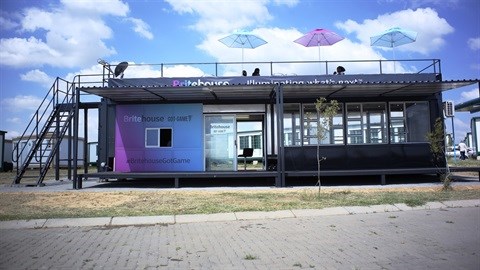Britehouse Got-Game has launched a self-sustaining and replicable vehicle through which other communities can benefit from corporate social investment (CSI)...
The social entrepreneur company is based on a digital hub, the first of which will be placed at the Sunrise Secondary School in the Diepsloot community in Johannesburg, providing a platform for teacher and student development, empowerment of women, enterprise development, access to information and employment.
Housed in a container equipped with smart technology and Internet access and provisioned with an online repository of education resources provided by the Seta accredited Mentec Foundation, it can be placed anywhere.
Managed by students from the community to whom corporate sponsors pay a stipend, it will be used for IT training and teacher development. It's a safe place for students to study and a place to apply for jobs online via a digital job platform. Students can post their CVs via a GOT-GAME portal, where businesses can find them easily. Having learned IT skills in the hub, people can then put them to work, capturing data, creating documents and doing other online projects for organisations, globally.
A place of many possibilities
"Britehouse Got-Game is a place of many possibilities, dictated by communities' own requirements", says Britehouse CEO, Scott Gibson. "There is no limit to Britehouse GOT-GAME's potential or what it can bring to the community. Because it is replicable, it reduces the cost, time and effort needed to make a difference."
Even more appealing, Gibson believes, is the coherence and consistency with which it is possible to continuously improve a community's options. A single hub opens many different possibilities simultaneously, enabling people in different sections of a single society to benefit.
"Britehouse Got-Game is the kind of sustainable empowerment vehicle that many businesses have been looking for to maximise the impact of their social investment. Some of our business partners, including SAP and Microsoft, have already recognised Got-Game's potential and are getting involved."
Samsung Electronics Africa is another partner that has an aligned its strategy with the Britehouse Got-Game initiative to share innovations and bring people new experiences that will change their lives.
As part of Samsung's efforts to support education initiatives in rural and under-served communities, the company will donate tablet devices and a solar power generator that will power the digital hub.
"The solar power generator is part of our company's drive for solar integrated solutions that are geared towards bringing much needed infrastructure access to underserved communities," says Ntutule Tshenye, Head of Public Affairs and Corporate Citizenship at Samsung Electronics Africa. "Our solutions are more relevant than ever today, with the power cuts and outages experienced in South Africa."
Fostering entrepreneurial behaviour in marginalised communities
Britehouse Got-Game is the culmination of four years of Britehouse's involvement in the Diepsloot community. This started with Britehouse meeting ten students and four teachers of the Kwena Molapo High School in 2010. Following teacher, student, and community recommendations, Britehouse successively implemented a number of initiatives that have begun to build an ethos of emotional and financial independence and social stability within the community.
Each small project has extended the success of the previous ones. This has enabled a focus on individual priorities while ensuring that the benefits are far-reaching, cohesive, and inclusive. Now, Britehouse Got-Game will maintain both cohesion and momentum while enabling the distribution of benefits on a much broader front.
The first Britehouse Got-Game hub has been established in the grounds of the Sunrise Secondary School, whose deputy principal used to work at Kwena Molapo High. Sunrise will derive 50% of the revenues generated by the hub.
Britehouse has also incorporated Got-Game into its broader enterprise development initiatives via a partnership with the founder of the Got-Game concept, Arthur Wade Anderson. The objective is to grow the digital hub part of his 100% black-owned social enterprise, as well as position his business to help micro businesses become adequately professionalised.
Britehouse Got-Game believes that CSI is evolving into a form of social entrepreneurship which not only solves a social problem in a business-like way but actually fosters entrepreneurial behaviour in marginalised communities. Scott Gibson concludes, "You can't stop a community making the most of opportunities, once people realise what is possible."






































